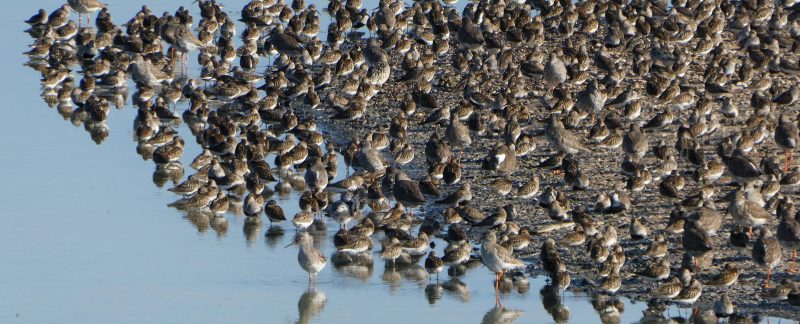WWRG had been operating as a Ringing Group since its inception. In consultation with its members, it was decided that becoming a charity would secure the Group’s longer-term future and allow it to take advantage of new opportunities to support our work. Alongside this we are changing our name to Wash Wader Research Group to better reflect the range of activities we do.
Mid-August 1959. It’s summer, and the harvest is in progress. On one field, near Terrington, a group of students from Cambridge University sets a borrowed rocket net on a recently harvested pea field. The Dunlin, unsuspecting, came on to the field at high tide to roost, and thus was the first catch taken and the Group formed. Little did they realise then that their activities would be carried on for 60 years (and counting…).
In that time there have been huge changes, both in what the birds do and how the group operates. Most obviously, Dunlin rarely need to roost on fields now. Land claim, which continued into the 1970s pushed the sea back and, with little saltmarsh available, the birds had to roost on fields; now the saltmarsh has grown enough that even on the highest tides they can generally roost there, safe from predators. The activities of the Group have also changed, rocket nets have been replaced by cannon nets, we catch on sites on all shores of The Wash and we have a permanent base from which to organise our activities. Our days bunking down on the dusty floor of a potato-chitting shed are (sadly?) long gone.
Our horizons have broadened too. In the days of those first catches very little was known about where birds on The Wash came from or went to. The birds ringed then, and subsequently found, in many parts of the world, have provided critical insight into the long journeys many of ‘our’ birds undertake – fundamental knowledge we might now take for granted. Now we are also interested in how long birds live, how they use The Wash, and how we can mitigate the effects of the many pressures they face, both local, such as fishing pressure and beach disturbance, and global – climate and sea-level change. To address these issues we are using an ever wider range of techniques from colour flagging to deploying high tech transmitters that can tell us not only how and where birds migrate, but how they use The Wash throughout the tidal cycle.
Because we are now much more than just a ‘ringing’ group we are changing our name to ‘Wash Wader Research Group’ and, alongside this, becoming a fully-fledged charity. This will ensure the Group has a resilient structure that will allow for its continuance in the long term. As a charity, we will also be able to take better advantage of opportunities that can arise, such as external funding to help with some of our work. Becoming a ‘Research Group’ does not, of course, mean that ringing will be any less important to what we do! Equally, being a Ringing Group didn’t mean that we didn’t do research – we already have an impressive range of research papers published. With these changes we are now well set to continue catching and marking and improving our understanding of how wader populations may best be conserved through research into the future.
We are grateful to our inaugural Trustees for guiding this process and all those who continue to support our activities, including landowners, farmers and farm staff, NE, RSPB, the Wildlife Trusts, the members of the public we meet when catching and all the ringers and supporters who help make the group so successful.

